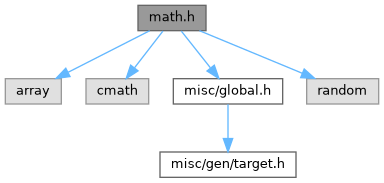|
| template<typename T > |
| T | sf::round (T value, T rnd) |
| | Rounds the passed value to a multiple of the rnd value.
|
| |
| template<typename T , typename S > |
| S | sf::calculateOffset (T value, T min, T max, S len, bool clip) |
| | Calculates the offset for a given range and set point.
|
| |
| template<typename T > |
| T | sf::clip (const T value, const T lower_limit, const T upper_limit) |
| | Template function clipping the given value between an upper_limit and lower_limit.
|
| |
| template<typename V , typename T > |
| bool | sf::isInRange (const V value, const T from, const T to) |
| | Checks if the passed value is in the given range.
|
| |
| template<typename T > |
| T | sf::random (T start, T stop) |
| | Generates random numbers within a specified integer range.
|
| |
| template<typename T > |
| T | sf::modulo (T k, T n) |
| | Modulo template function.
|
| |
| template<typename T > |
| T | sf::toAbs (T v) |
| | Gets the absolute value of a passed scalar value.
|
| |
| template<typename T > |
| T | sf::ipow (T base, int exponent) |
| | Fast integer power-of function.
|
| |
| template<typename T > |
| constexpr T | sf::toRadians (T degrees) |
| | Converts degrees to radians.
|
| |
| template<typename T > |
| constexpr T | sf::toDegrees (T radians) |
| | Converts radians to degrees.
|
| |
| template<typename T > |
| bool | sf::isEqual (T a, T b, T epsilon=std::numeric_limits< T >::epsilon()) |
| | Compares 2 floating point values of the same type with a given epsilon.
|
| |
| template<typename T > |
| bool | sf::isZero (T value, T epsilon=std::numeric_limits< T >::epsilon()) |
| | Check if the passed value is zero or near zero according the given epsilon.
|
| |
| template<typename T > |
| bool | sf::isValidValue (T value) |
| | Check if the passed value is not NaN or infinity.
|
| |
| template<typename T , typename... Args> |
| size_t | sf::maxArgumentIndex (T first, Args... args) |
| | Finds the index of the largest element passed as an argument.
|
| |
| template<typename T , typename... Args> |
| size_t | sf::minArgumentIndex (T first, Args... args) |
| | Finds the index of the smallest element passed as an argument.
|
| |
| template<typename T , size_t N> |
| size_t | sf::maxArrayIndex (const std::array< T, N > &arr) |
| | Finds the largest element index of the passed array.
|
| |
| template<typename T , size_t N> |
| size_t | sf::minArrayIndex (const std::array< T, N > &arr) |
| | Finds the largest element index of the passed array.
|
| |
| _MISC_FUNC int | sf::precision (double value) |
| | Returns the precision of the passed floating point value. This is the amount of characters after the point without the trailing zeros. When the value is 12300.00 the value returned is 3. When the value is 0.0123 the value returned is also 3.
|
| |
| _MISC_FUNC int | sf::digits (double value) |
| | Returns the amount of digits which are significant for the value. When the value is 12300.00 the value returned is -2. When the value is 0.0123 the value returned is 4.
|
| |
| template<typename T > |
| std::pair< T, int > | sf::getMantissaExponent (T value) |
| | Gets the mantissa and exponent part of a floating point value.
|
| |
| template<typename T > |
| int | sf::magnitude (T value) |
| | Gets the order of magnitude of the passed floating point value. Examples: magnitude(0.001234) => -2 magnitude(0.123400) => 0 magnitude(12340.00) => 5.
|
| |
| _MISC_FUNC int | sf::magnitudeObsolete (double value) |
| | Gets the order of magnitude of the passed double value. Examples: magnitude(0.001234) => -2 magnitude(0.123400) => 0 magnitude(12340.00) => 5.
|
| |
| _MISC_FUNC int | sf::requiredDigits (double round_val, double min_val, double max_val) |
| | Gets the amount of required digits needed when drawing a scale.
|
| |



